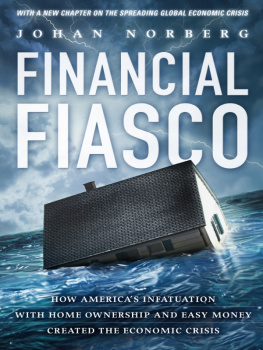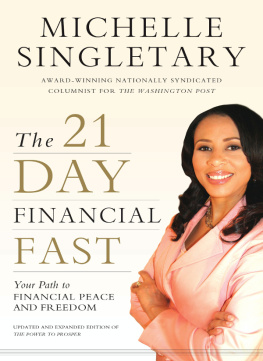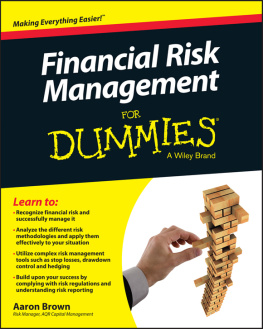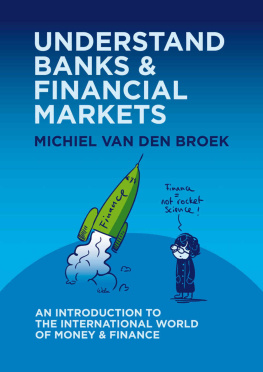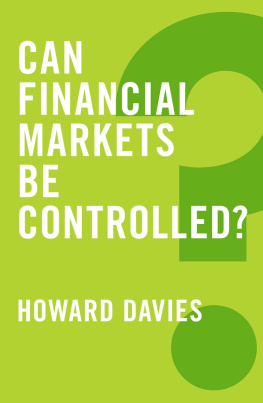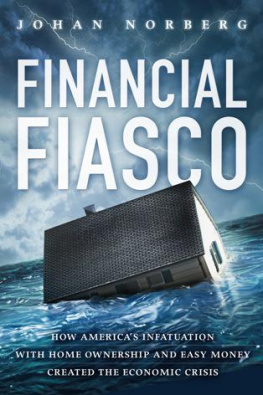JOHAN NORBERG
FINANCIAL
FIASCO
HOW AMERICA'S INFATUATION
WITH HOMEOWNERSHIP AND EASY MONEY
CREATED THE ECONOMIC CRISIS
Copyright 2009 by Cato Institute.
All rights reserved.
First Paperback Printing: 2012
Library of Congress Cataloging-in-Publication Data
Norberg, Johan, 1973
Financial fiasco : how Americas infatuation with homeownership and easy money created the economic crisis / Johan Norberg.
p. cm.
Includes bibliographical references and index.
ISBN 978-1-935308-13-3 (alk. paper)
1. Home ownershipGovernment policyUnited States. 2. Financial crisis United StatesHistory21st century. 3. Keynesian economics.
I. Title.
HD7287.82.U6UN67 2009
330.973dc22 2009026629
Cover design by Jon Meyers.
Printed in the United States of America.
CATO INSTITUTE
1000 Massachusetts Ave., N.W.
Washington, D.C. 20001
www.cato.org
For Alexanderwho will look back on these as the good old days.We will not have any more crashes in our time. I find the markets very interesting, and the prices low. So where should a crisis come from?
John Maynard Keynes, 1927
The most common beginning of disaster was a sense of security.
Marcus Velleius Paterculus, Compendium of Roman History
Contents
In the last three years, policymakers in the United States, Europe, and China have responded forcefully to the great recession. A crisis caused by cheap money, indebtedness, and bad investments has been met with even cheaper money and more debt and by subsidizing and protecting bad investments and overproduction in the housing sector, the infrastructure, and the car industry. In short, they are trying to do what the Federal Reserve did in 2001, when it saved the economy from a bursting bubble by inflating a new one, with disastrous results.
In this new edition, I have not changed the original text, but I have added a new chapter about government action in the wake of the crisis and about how the financial fiasco resulted in the euro crisis. It is much too early to tell whether these actions will have the intended effect. It could instead result in investors fleeing governments suffering under unsustainable debts. There might be a hard landing in China, the euro could collapse, and there might be a crisis of confidence in the dollar.
But there is also the chance that these short-term measures will succeed in inspiring our animal spirits more than market opportunities and hard data could have done on their own. In that case, we will have another episode of short-term investments, new bubbles, and a reinforced belief that investors will always be saved by taxpayers and the printing presses, no matter how much they engage in reckless lending and speculation.
At times when listening to politicians and businessmen these last few years, it has felt like we are living in a 2008 article from the satirical newspaper The Onion:
A panel of top business leaders testified before Congress about the worsening recession Monday, demanding the government provide Americans with a new irresponsible and largely illusory economic bubble in which to invest.
Unfortunately, the reality we face is much less amusing.
Stockholm, Sweden, March 2012
I can calculate the motions of the heavenly bodies, but not the madness of people.
Isaac Newton, after losing a fortune in the South Sea Bubble in 1720
In the fall of 1991, a high-pressure system from northern Canada collided with a powerful low-pressure system over the coast of New England. The large temperature contrast in such a small area gave rise to a cyclone. The cyclone, in turn, absorbed a nearby dying hurricane, which created an enormously powerful storm. The winds at times attained 75 miles per hour, and 35-foot waves shook unfortunate seafarers. The biggest individual wave measured was 100 feet high.
Meteorologist Bob Case at the National Weather Service in Boston explained that circumstances were perfect for the emergence of a storm. Three independent weather phenomena happened to occur at the exact times and places required for them to interact to create the most severe storm in living memory, causing great loss of human life and property. Circumstances wereunfortunatelyperfect for devastation.
The world has just been struck by a perfect financial storm. A series of circumstances that individually would not have had to lead to disasterlow- and middle-income countries starting to save money; the head of a central banks wishing to avoid a crisis; political demands to expand homeownership; new financial instruments; and new banking regulations, credit-rating requirements, and accounting rules intended to prevent cheatingcame into existence at the same time and reinforced one another into what Alan Greenspan has called a once-in-a-century event. Circumstances were perfect for a financial storm so tremendous that few people now alive have seen anything like it. The monster waves are swallowing gigantic banks and long-established industrial companies alike. The wind gusts are tearing apart entire economies.
Many politicians and businesspeople who use the perfect storm metaphor for this crisis do so to explain its catastrophic consequences. They believe they took all the necessary precautions and sailed their ships the way they should, but that they happened to find themselves in a storm beyond their control. As a result, they cannot take responsibility for the losses and problems that have arisen. However, my intention in writing this book is to show that each circumstance that led to the crisiseach low and high, and each colliding hurricanewas the result of conscious actions on the part of decisionmakers in companies, government agencies, and political institutions.
What makes todays crisis unique is that it has taken such a short time to wash over practically every corner of the world. Other countries have been negatively affected by the backwash of national crises throughout the 20th century, but never before has a financial crisis as such happened in so many places at the same time and in such a similar form. The panic went global in a moment. Two hundred years ago, the Rothschild brothers could earn a fortune by being spread across many European cities: Nathan lived in London, Amschel in Frankfurt, James in Paris, Carl in Amsterdam, and Salomon sometimes here and sometimes there. This enabled them to obtain information from one another immediately, so that before anyone else, they could buy securities and resources where they were cheapest and sell them where they were dearest.
Today computers, satellites, and global media have given us a global market where each player can be a mini-Rothschild. This makes it harder for anyone to profit from being better informed, and it makes the division of labor and the use of resources more efficient, which gives us all greater opportunities. But it has also given rise to new risks, as bad news now travels so fast across the globeespecially since the media are becoming ever more likely to shout at the top of their voice. In fact, a comparison shows that they have been significantly more alarmist this time than they were after the 1929 stock market crash. The globalization that only yesterday seemed so relentless has changed into its opposite. Right now we are experiencing a fall in global trade, investment, transportation, migration, and tourism. People all over the world are losing their jobs, their businesses, and their homesand yet what we have seen so far is just the beginning of the recession.

